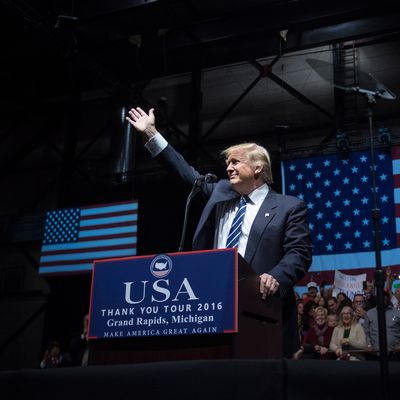
Eight years ago, the 44th president of the United States prepared to take office after winning a clear majority of the popular vote and 365 electoral votes. Though he had won the presidential nomination of his party via a protracted contest with Hillary Clinton, his party was relatively united and enjoyed a filibuster-proof majority in the Senate and a comfortable margin in the House. And Obama himself was at the head of a grassroots army that was as large and enthusiastic as anything seen in national politics since the 1960s.
Within a year or so, that grassroots army, theoretically transferred to a new organization called Organizing for America, had melted away to virtual irrelevance. Centrist Senate Democrats were successfully extorting the White House for concessions in exchange for their support for the Affordable Care Act, and Democrats from energy-producing states were sabotaging the administration’s climate-change legislation in both chambers of Congress. By the end of 2009, the big grassroots politics story was not about Obama’s legions, but about the right-wing tea-party movement, which ultimately claimed partial credit for a big Republican midterm victory.
Flash forward to the present, and Donald Trump, having executed what can only be described as a hostile takeover of the Republican Party, followed by a popular-vote loss and a narrow Electoral College win secured by 77,000 votes in three states, continues to struggle with underwater favorability ratings. The big mystery in Washington is whether he’s secretly planning a quick start in January, or is so far behind the learning curve that he will be hopelessly swamped by the responsibilities of the office from the get-go.
Yet the president-elect is benefiting already from a well-organized base of rabid supporters who are already intimidating congressional Republicans into awaiting instructions from Trump and swallowing enormous misgivings about the new administration. Here’s how Politico describes this phenomenon:
Since the election, numerous congressional Republicans have refused to publicly weigh in on any Trump proposal at odds with Republican orthodoxy, from his border wall to his massive infrastructure package. The most common reason, stated repeatedly but always privately: They’re afraid of being attacked by Breitbart or other big-name Trump supporters.
“Nobody wants to go first,” said Rep. Mark Sanford (R-S.C.), who received nasty phone calls, letters and tweets after he penned an August op-ed in The New York Times, calling on Trump to release his tax returns. “People are naturally reticent to be the first out of the block for fear of Sean Hannity, for fear of Breitbart, for fear of local folks.”
I don’t recall reading anything similar about congressional Democrats in late 2008 or early 2009.
There are, of course, some key differences in circumstances between the Obama and Trump transitions. Obama was dealing with an ongoing national and global economic crisis at this point eight years ago. The way he chose — or was forced — to deal with that crisis through cooperation with the very bankers and other Wall Street figures many of his “base” supporters thought should instead be in leg-irons unquestionably sapped grassroots enthusiasm for the new administration.
There was no (and still there is no) progressive equivalent to Breitbart, a frantically active and abrasive outlet for the new president’s point of view, respecting few of the inhibitions of traditional journalism and happy to serve as a Trumpite commissar lashing Republicans into line. And while Twitter existed eight years ago, it had yet to mature into the rapid-reaction instrument it has now become. And it is simply impossible to imagine Barack Obama availing himself of Twitter to organize vengeance against critics and disciplinary action toward ostensible allies.
Arguably Obama did not use the tools he did have at his disposal. In a bitter commentary after the midterm debacle of 2010, Obama’s 2008 campaign blogger complained he had left his grassroots network “on the sidelines.”
[A]t seemingly every turn, Obama has chosen to play an inside game. Instead of actively engaging supporters in major legislative battles, Obama has told them to sit tight as he makes compromises behind closed doors …
During the health-care battle, rather than rallying the grass roots behind a public option - a provision Obama repeatedly supported and a clear majority of Americans backed - supporters were told to voice generalized support for “reform.” In an e-mail from OFA, I was asked to call my senator, Chuck Schumer, a clear champion of the health-care plan that included a public option. Why not ask people to target centrist Democrats who were blocking reform, such as Max Baucus?
That is not a choice Donald Trump seems likely to make.
Before we conclude that Trump and his minions will rule the streets and social-media channels next year or beyond, the $64,000 question is whether something like the tea party will arise on the left. There is certainly enough passionate opposition to Trump out there to provide the fuel for a big grassroots fire. It could manifest itself in simple opposition to Trump’s agenda and base of support, or could instead mainly operate to ensure Democrats don’t compromise or fold. The bigger imponderable is whether progressive leaders can ignite such a movement and provide it with some direction, or at least coordination. Either way, Beltway insiders of every persuasion may be looking nervously over their shoulders for ambushes as the New Year begins.






























